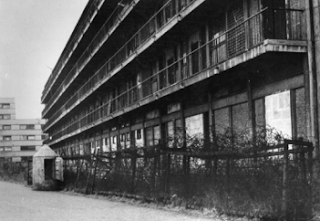 Growing up in California in the 1920s, Louie was a hellraiser, stealing everything edible that he could carry, staging elaborate pranks, getting in fistfights, and bedeviling the local police. But as a teenager, he emerged as one of the greatest runners America had ever seen, competing at the 1936 Berlin Olympics, where he put on a sensational performance, crossed paths with Hitler, and stole a German flag right off the Reich Chancellery. He was preparing for the 1940 Olympics, and closing in on the fabled four-minute mile, when World War II began. Louie joined the Army Air Corps, becoming a bombardier. Stationed on Oahu, he survived harrowing combat, including an epic air battle that ended when his plane crash-landed, some six hundred holes in its fuselage and half the crew seriously wounded.
Growing up in California in the 1920s, Louie was a hellraiser, stealing everything edible that he could carry, staging elaborate pranks, getting in fistfights, and bedeviling the local police. But as a teenager, he emerged as one of the greatest runners America had ever seen, competing at the 1936 Berlin Olympics, where he put on a sensational performance, crossed paths with Hitler, and stole a German flag right off the Reich Chancellery. He was preparing for the 1940 Olympics, and closing in on the fabled four-minute mile, when World War II began. Louie joined the Army Air Corps, becoming a bombardier. Stationed on Oahu, he survived harrowing combat, including an epic air battle that ended when his plane crash-landed, some six hundred holes in its fuselage and half the crew seriously wounded.On a May afternoon in 1943, Louie took off on a search mission for a lost plane. Somewhere over the Pacific, the engines on his bomber failed. The plane plummeted into the sea, leaving Louie and two other men stranded on a tiny raft. Drifting for weeks and thousands of miles, they endured starvation and desperate thirst, sharks that leapt aboard the raft, trying to drag them off, a machine-gun attack from a Japanese bomber, and a typhoon with waves some forty feet high. At last, they spotted an island. As they rowed toward it, unbeknownst to them, a Japanese military boat was lurking nearby. Louie’s journey had only just begun. ~www.amazon.com
Zamperini Timeline
Jan 26, 1917 - Louis Silvie was born in Olean, New York, on January 26, 1917, the son of Italian immigrants Anthony and Louise Zamperini. The family moved to Torrance, California, when Louis was two. By the time he was 14 he was heading for serious trouble. An accomplished burglar he often stole food and booze, got into fights that left his victims bruised, bleeding and occasionally unconscious and had little respect for the law.
1936 - A relatively trouble child who stole everything in sight, he grows up to become one of the greatest track stars of his time, shattering the national high school record in the mile and becoming one of the youngest members of the US Olympic team in 1936. Many felt that Zamperini would become the first person to break the four minute mile.
1943 - Louis Zamperini became a bombardier whose plane disappeared in the Pacific Ocean in 1943. He survived sharks, starvation and strafing only to be rescued by a Japanese boat. He spent the rest of the war in prison camps and endured cruelty so profound, it's painful to repeat.
1998 - In 1998, the Olympic Winter Games were held in Nagano, Japan, just outside the town where Louis had been held captive. The people of Nagano asked Louis to carry the Olympic flame as part of the torch relay, and the host broadcaster (CBS) created a 45-minute feature about Louis’ life, that aired during the telecast of the Closing Ceremony. ~keynotespeakers







